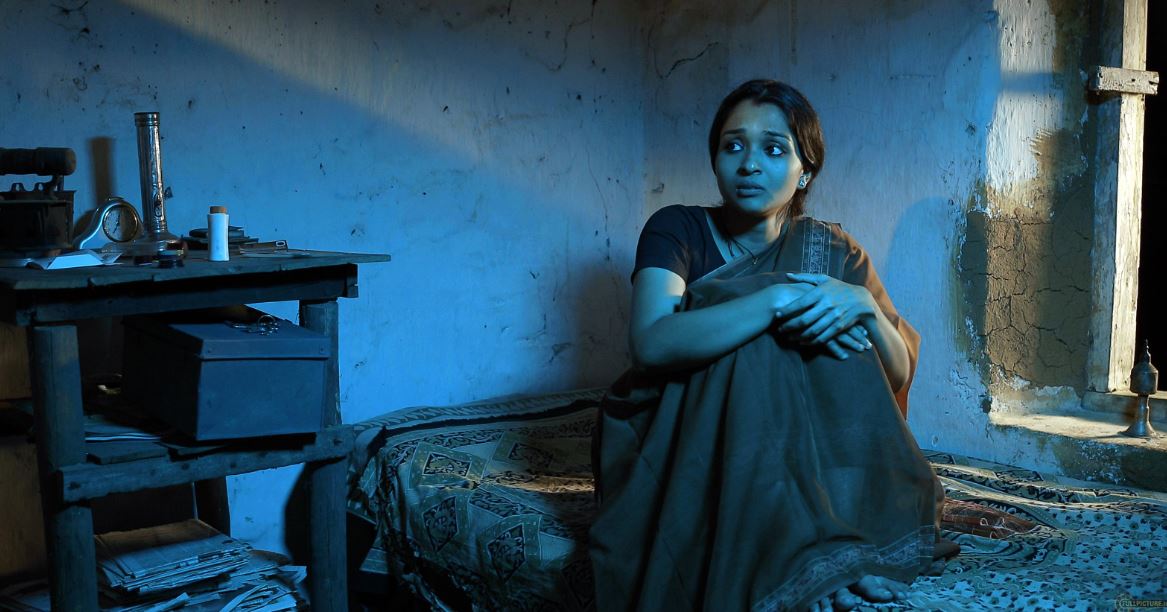Trigger warning: Abuse and rape
Through the course of this 102-minute long film, the scene that the viewer is brought back to most often is that of colour-changing lights emanating from three alcohol bottles fixed onto a wall. It’s the light in newly wed Sudha and Chandran’s room – the light that Chandran invented before Sudha came into his life and the light that he refuses to attach a switch to, despite all the inconvenience it causes to his partner.
https://www.youtube.com/watch?v=qpZg4LL4nY4
This light is the primary plot device around which the narrative of debutante director Rahul Riji Nair’s Malayalam film Ottamuri Velicham (A Light in the Room) revolves. Its imposing presence is established on the first night the couple spends together, it is the main source of conflict between Sudha and Chandran, and in the end, it is the means through which Sudha regaining control over her life is powerfully established.
He doesn’t see her as an equal companion, but as a wife who needs to be taught how to behave.
Told against the backdrop of a scattered settlement atop a hill in Kerala (whose overwhelming natural beauty is captured forcefully by the cinematographer, Luke Jose) is this story of the way in which violence comes to inhabit Sudha’s daily life.
She starts off by wanting to be her husband’s companion, wanting him to eat his breakfast before he leaves, wanting to go grocery shopping with him, wanting to keep hot water for him to bathe on a cold night. But he constantly belittles her attempts. He doesn’t see her as an equal companion, but as a wife who needs to be taught how to behave. She is the object whom he takes out all his frustrations on – raping her, beating her up, and torturing her using new tools night after night.
Also read: The Malayalam Film Industry And AMMA Have Failed Women Everywhere
This emotionally vivid film makes the viewer feel the intensity of Chandran’s destructive aggression and Sudha’s abiding anxiety in equal measure. The tension builds up well, especially in the different sequences where Sudha attempts to get rid of her husband. You wish that the shaking hand holding the knife or the tentatively crawling scorpion will succeed, but you know the power that the wild boar’s male equivalent wields, and you only hope that the failed attempt will not result in the onslaught of more violence.
Ottamuri Velicham is held together by compelling performances from the cast, especially lead actor Vinitha Koshy, who emotes strongly through silences. The narrative is tight and the story, complete with wild boar/entitled man and mother nature/wronged woman analogies is tied together well. The music of the film, especially the well-composed allegorical songs are put to good use, establishing a harmonious setting at the start, and the entrenchment of a routine of violence in the middle.
One can’t help but wonder what the need for such a story is, and what this story does, that hasn’t been done before.
But the question that lingered, and continues to linger in my mind is the need for such a story to be told. The film ending with a write-up on the menace of marital rape makes it clear that the director is positing this as a ‘message-driven’ film. One can’t help but wonder what the need for such a story is, and what this story does, that hasn’t been done before. The treatment might be different but the tropes of the angry, entitled household head, the battered but strong-willed wife, the complicit mother/mother-in-law and the shocked but silent community have all been explored, even in mainstream Indian cinema, particularly in rape-revenge films that became a genre of their own in the 70s and 80s.
More recently, festival films such as Sexy Durga (2017) and Ajji (2017) have explored the intensity of emotions like fear, anger and anxiety produced by violent gendered power dynamics, through more realistic portrayals.
Also read: Cinema Of Male Apathy: Rape Scenes In Malayalam Films Through The Ages
In the question-and-answer session post the film screening at the Mumbai Film Festival on Monday night, the moderator spoke about the relevance of such a film especially in the time of the #MeToo movement. That comment felt jarring, and I thought about it for a very long time. Ottamuri Velicham is a well-told story with a well-meaning message, but is it a new story reflective of new, changing times, or is it part of an age-old trend of progressive men ‘sensitively’ telling gendered tales of the woman’s plight?
Featured Image Source: Full Picture
About the author(s)
Shrishti is a student of Media and Cultural Studies. Long rants with female friends help her channelize rage on the world around. Good food, pretentious poetry and cute canines provide her endless pleasure.




